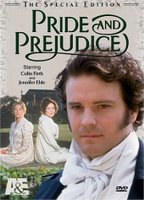Austen powers
 It is a truth universally acknowledged - well mostly acknowledged - that the 1995 BBC miniseries of Jane Austen's Pride and Prejudice is the definitive filmed version of the classic novel. The extended format allows for a full presentation of Austen's story of repressed love set against the repressive class system of post-Georgian England. And Colin Firth so owns his role as Mr. Darcy that he both inspired the character and played the part of Mark Darcy in the book and film of Bridget Jones' Diary. Owning a copy of the Beeb DVDs myself, I was doubtful that there was either a need or a capacity to top the miniseries.
It is a truth universally acknowledged - well mostly acknowledged - that the 1995 BBC miniseries of Jane Austen's Pride and Prejudice is the definitive filmed version of the classic novel. The extended format allows for a full presentation of Austen's story of repressed love set against the repressive class system of post-Georgian England. And Colin Firth so owns his role as Mr. Darcy that he both inspired the character and played the part of Mark Darcy in the book and film of Bridget Jones' Diary. Owning a copy of the Beeb DVDs myself, I was doubtful that there was either a need or a capacity to top the miniseries. Seeing the just-released version of P&P on the big screen, however, I must admit that there may be a new Sheriff of Herefordshire (or Derbyshire) in town. With perhaps the exception of the casting, I'm tempted to say that it surpasses the BBC's effort in all respects.
Seeing the just-released version of P&P on the big screen, however, I must admit that there may be a new Sheriff of Herefordshire (or Derbyshire) in town. With perhaps the exception of the casting, I'm tempted to say that it surpasses the BBC's effort in all respects.Although never having lived in England at the end of the 18th century, to my eyes the film nails the period spot on. Where the miniseries' sets, locales, and costumes were reasonable facsimiles of the manors, estates, and dress of the time, the film's really bring that England to life. The balls that the Bennet sisters attend are not stuffy and sterile affairs but vibrant and raucous and sweaty. The estates more accurately reflect the social standing of their inhabitants: the Bennets' is a bit run down, dirty, and lived-in; Rosings Hall is now indeed as grand as Mr. Collins would have anyone that cared to listen believe.
Additionally, in the 2.35:1 "scope" aspect ratio, the new film gives us a grander vision of the book than was literally possible with the television series. Director Joe Wright uses the widescreen to create a big-R Romantic adaptation. Lizzie perched on a cliff overlooking the vast valleys near Darcy's estate of Pemberley. Her aunt and uncle picnicking at the stump of a gargantuan tree. Journeys by foot and hoof over expanses of the English countryside. This is love that fills and rivals the natural backdrop against which it is set.
 And yet, Wright manages to squeeze into two hours what the BBC did in four and a half. I would have to go back with the book and the discs to compare what specifically got cut, but it didn't feel like much and certainly not anything essential. Mr. Wickham's presence is reduced but he is, of course, a bit of an ass and barely missed. The miniseries is the completist version to be sure, but the film is by no means a Cliffs Notes or Classics Illustrated cut job. If anything, it tacks on a coda not found in the book that is as unnecessary as it is clumsily written and played.
And yet, Wright manages to squeeze into two hours what the BBC did in four and a half. I would have to go back with the book and the discs to compare what specifically got cut, but it didn't feel like much and certainly not anything essential. Mr. Wickham's presence is reduced but he is, of course, a bit of an ass and barely missed. The miniseries is the completist version to be sure, but the film is by no means a Cliffs Notes or Classics Illustrated cut job. If anything, it tacks on a coda not found in the book that is as unnecessary as it is clumsily written and played.Where I think the Beeb's miniseries remains superior, however, is in the acting. Firth's haughty Darcy is still the pitch-perfect paragon of pride. Matthew Macfadyen plays it cooler, seeming more oblivious to those beneath him than openly disdainful. Kiera Knightley's Lizzie is all giggles and dimply grins but not as fully possessed of the sense of otherness as Jennifer Ehle's. Instead of being above and beyond the social climbing completely, Elizabeth now seems in the same game as her sisters, albeit a better and more cagey player. The supporting cast in both versions is fairly a wash though and excellent in all respects. Dame Judi Dench brings the same scenery-chewing to Lady Catherine de Bourgh as she did to Queen Elizabeth in Shakespeare in Love, when she won the Oscar for about three minutes of total screentime.
All of which dovetails to my real point, following up on Billy Mernit's post last week on so-called "chick flicks" and why I think the term, if not some of the actual films, needs to die. More to come.
P.S. Just out is Kate Bush's first album in twelve years, Aerial, and it is fantastic. A two-disc set, the first is a somewhat disparate collection of songs while the second is a more cohesive conceptual work. Along with Saint Etienne's Tales From Turnpike House (still import only at the moment, but also worth the wonga) it's a good year for concept albums about a day in the life in the Mother Country.

0 Comments:
Post a Comment
<< Home